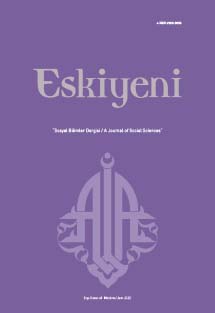el-Envâru’l-ilâhiyye Adlı Eseri Bağlamında Şemseddin
es-Semerkandî’nin Kelamî Görüşleri
Shams al-Dīn al-Samarqandī’s Theological Views in the Context of his work al-Anwāru al-ilāhiyya
Author(s): Selami Yanmaz, Bilal TaşkınSubject(s): Islam studies, History of Islam
Published by: Anadolu İlahiyat Akademisi
Keywords: Kelam; Felsefe; Mantık; Münazara; Şemsüddîn es-Semerkandî; el-Envârü’l-İlâhiyye;
Summary/Abstract: Since its emergence, kalām (theology), which has developed by renewing itself according to current discussion topics, has aimed to produce solutions for many theological problems that have emerged during its development. In line with this aim, many scholars from the early periods of Islam have written extensive or summarized works dealing with all or some of the problems of faith. The method called "philosophical kalām", which developed after Fakhr al-Dīn al-Rāzī and discussed the problems within the philosophical tradition from a religious point of view, also emerged for this purpose. Although this method was originally initiated by Ash‘arite theologians, it was later adopted and continued by Māturīdī theologians. Shams al-Dīn al-Samarqandī was among the Māturīdī theologians who composed works according to this new method. Samarqandī wrote three basic theological texts according to this method. These are his al-Sahāif al-ilāhiyya, al-Anwār al-Ilāhiyya, and al-Mu‘takadāt. The latter two works differ from the former and from other post-Rāzī theological texts in their content. These two works, which examine the basic concepts and issues of logic, debate, and theology, have an original systematic. In addition, in the work, al-Samarqandī put forward his own views on many issues such as the definition of the concept of existence, divine attributes, tawhīd (unity), name-definite (ism-musammā), the issue of beshā’ir al-nubuwwa (indications of prophethood), the increase and decrease of faith, the husn-qubh (good-evil) and tafdīl (the primacy of the first generations). For example, in the division of divine attributes, he differs from the Māturīdī school by preferring a different division in the form of essential (haqīqī) and secondary (idāfī) attributes. Again, for example, it can be mentioned in this context that he prefers goodness and evil to be zātī (intrinsic), wasfī (qualitative) or i‘tibārī (relative) in the matter of husn and qubh, and that he adopts a different opinion than the general opinion in the matter of tafdīl. This study aims to identify and analyze Samarqandī’s original theological evaluations in his work al-Anwār. However, for this purpose, not only Samarqandī's al-Anwār, but also his other theological works and the texts written by pre-Samarqandī theologians were consulted.
Journal: Eskiyeni
- Issue Year: 2023
- Issue No: 49
- Page Range: 479-500
- Page Count: 22
- Language: Turkish

